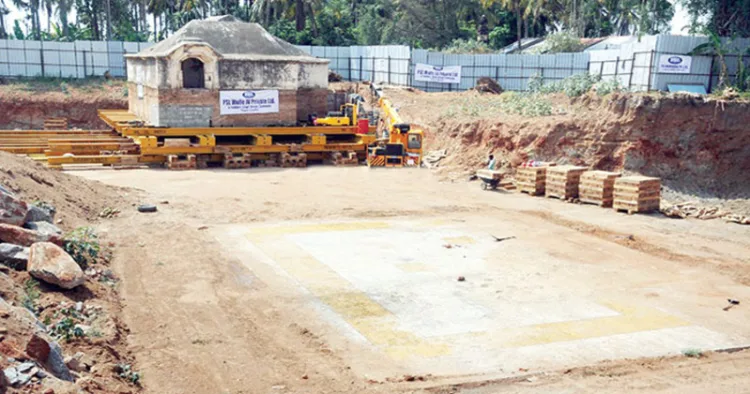Mandya: The revelation that over 70 Record of Rights, Tenancy and Crops (RTC) entries in Srirangapatna and surrounding areas are classified as Waqf Board properties has sparked significant concern among residents and farmers. This includes notable government properties like the State and Central Archaeological Department Museum, monuments, and the historic Maddina Mane,(ammunition house) now said to be under the jurisdiction of the Karnataka State Waqf Board. The implications of such classifications are raising alarm bells as they threaten the rights and livelihoods of numerous farmers.
Recent investigations have unveiled that not only are government properties listed as Waqf Board assets, but many farmers’ lands within the town and taluk have also been marked as Waqf properties in column No. 11 of the RTC records. This has understandably created unease among the local populace, who are now questioning the legality and motives behind these listings.
In a startling development, properties that have historically fallen under the purview of the Directorate of Archaeology and Museums of the Government of Karnataka, including those in Survey Numbers 17, 28, 63, 68, and 73, have been annexed as Waqf properties in the RTC records for the year 2014-15. Particularly concerning is the 20-gunta government land found in Survey Number 758, designated as Government Makan, along with a significant portion of Raghu Chaitanya Y. Nayak and Yashodhara G. Nayak’s property that has also been classified under the Waqf Board.
Further scrutiny reveals that Survey Numbers 193/1, 193/2A, 193/2B, 194, and several others belonging to Doddaharohalli village in Arakere Hobli Taluk have been added to the Waqf Board’s list, along with property from Kiranguru village. A total of over 70 RTC records have been flagged across various villages, indicating a widespread pattern of misappropriation.
Agricultural land, which forms the backbone of many local families, is at risk, and the situation is exacerbated by a lack of awareness among farmers regarding the listings. Many landowners are oblivious to the fact that their properties have been classified as Waqf Board assets, leaving them vulnerable to potential legal actions and ramifications.
The Waqf Board’s extensive encroachment raises serious questions about governance, transparency, and the rights of landowners in Karnataka. Residents are increasingly feeling the urgency to verify their RTCs and contest what they believe to be a systematic scam by the Waqf Board. Alarmingly, it has been reported that modifications to the Mutation Records (MR) are being made following directives from the Sub-Divisional Officer, altering the status of lands to reflect Waqf Board ownership.
These troubling developments have fostered an atmosphere of anxiety among farmers and residents throughout Srirangapatna. With fears growing that more properties may soon be categorized as Waqf in the future, calls for clarifying land rights and protecting local agricultural interests have intensified. Community groups and concerned citizens are demanding accountability from local authorities and the Waqf Board, urging them to address these contentious listings and uphold the rights of landowners.
As the situation unfolds, it is clear that a thorough investigation into the Waqf Board’s claims is essential to safeguard the interests of farmers and preserve the historical and cultural legacy of Srirangapatna and its vicinity.
BJP launches agitation
In a recent address in Bidar, Basanagouda Yatnal Patil vehemently condemned the Karnataka State Waqf Board, emphasizing that the ongoing struggle is not aimed at any individual or political entity, but rather a fight for the farmers’ rights and the integrity of their land. “Our struggle is against the Waqf,” he stated, making it clear that this battle transcends the immediate political landscape, including the upcoming by-elections.
Yatnal’s remarks were pointed, highlighting deep-seated grievances tied to historical injustices, stating, ” Maha Guru Mallikarjun Kharge’s mother and sister burnt alive by fundamentalists. However, Kharge says that Razakar is not a Muslim. Are Razakar Lingayats Brahmins?” His comments are a stark reminder of the complex social and political tapestry in which these issues are situated, underscoring the urgency of protecting farmers’ lands from what he sees as encroachment by the Waqf Board. He criticized CM Ibrahim for issuing notices to protestors, adding, “I have replied to him. Yatnal said that he has not left any land for Khabarasthan, will he leave it to us?”
The Waqf property contention has emerged as a significant issue across Karnataka, with an alarming 13,295 acres in Bidar district alone registered as Waqf properties. Of this, the Waqf Board has already seized 217 acres. Concerns have been raised that the Board’s claims extend even to properties traditionally seen as community assets, including institutions like the Basava Seva Pratishthan in Basavagiri where the name of the Waqf Board has been entered into the title deed for a 5-acre, 15-gunta plot. The repercussions of this encompass every village, agricultural stretch, memorial, hospital, and monastery in Bidar, casting a long shadow over local communities.
These developments have ignited protests throughout the state, where anti-Waqf sentiments are becoming increasingly vocal. The BJP, under the leadership of state president BY Vijayendra, has organized a state-wide protest against the perceived injustices inflicted upon farmers, alleging that Chief Minister Siddaramaiah’s administration has betrayed the agricultural community. The message is clear: farmers’ concerns must take precedence, and their rights over their land must be safeguarded.
In a bid to intensify their message, the BJP has rolled out a three-team anti-Waqf campaign. This initiative includes an awareness drive spearheaded by BY Vijayendra, aimed at educating the public and rallying support against what they deem a systematic overreach by the Waqf Board. However, internal party dynamics may complicate matters, as conflicting strategies between party factions could hinder their effectiveness. There are whispers that the tensions between two teams addressing the same issue might potentially undermine the party’s public image and unity.




















Comments